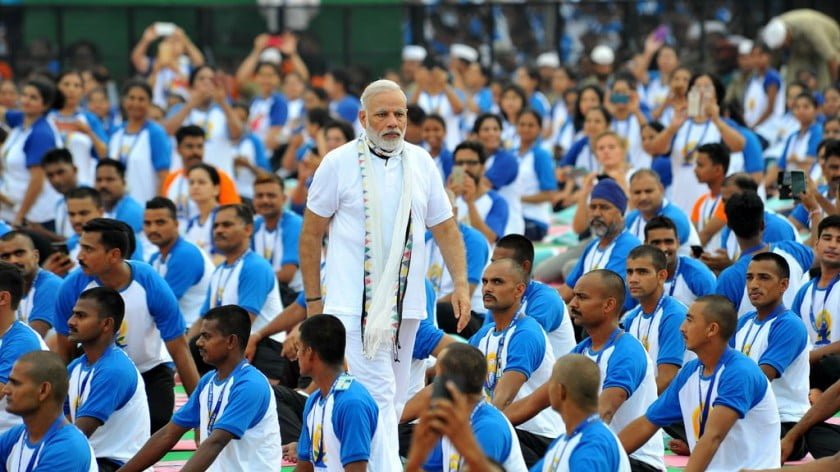India’s BJP Is a Neoliberal Party Masquerading as a Protectionist One
The BJP stunningly lost five regional elections earlier this month in a development that proves that people are no longer as distracted by the neoliberal party’s identity politics as they once were and are instead very well aware that they’ve been duped over the past half-decade by a movement that espouses populist protectionist rhetoric but practices the exact opposite instead.
Modi’s BJP Is In Panic Mode
The closing days of 2018 are an opportune time to reflect on the seismic development that just recently rocked India’s domestic politics after the ruling BJP stunningly lost five regional elections earlier this month ahead of a general vote scheduled for some time next spring. It was hitherto taken for granted by many domestic and international observers alike that the BJP had successfully monopolized the Indian political scene after the Congress opposition party continued to crumble following a series of electoral defeats, but it now appears as though those presumptions were mistaken because an influential percentage of voters rejected the BJP for reasons that the world is still struggling to understand. Some have attributed it to a generic anti-incumbency trend while others have said that it’s a reaction to the ruling party’s weaponization of identity politics, and while both of those are likely true to differing extents, the real reason lies with the economy.
Much has been written about India’s breakneck growth over the past couple of years and the hyped-up promises that it purportedly has to one day surpass China and become the world’s leading economy, though the fact of the matter is that these macroeconomic statistics are extraordinarily misleading because they fail to reflect the on-the-ground consequences of Modi’s policies. The government’s sudden reversal on allowing international e-commerce giants to operate in the country with minimal regulations speaks to the authorities’ fear that they’ve gone way too far in their neoliberal economic policies of recent years and have to finally backtrack on some of them if they want any chance of winning back former BJP voters from the opposition. This somewhat surprising course of events says a lot about the BJP’s reading of the domestic political situation at this moment and what they believe motivated people to “defect” from their party during the latest regional elections.
Big Dreams, Bigger Disappointments
To better understand how and why this came to be, as well as more confidently comprehend the overall significance that this observation holds in terms of the bigger picture, it’s important to be reminded of the BJP’s backstory. The party promised voters that it would respect the protectionist traditions that India has been progressively distancing itself from since the end of the Old Cold War but also implied that it would implement a neoliberal twist of sorts to help their country better integrate into the global economy at large. Together with its vow to preserve the religious traditions of the Hindu-majority population in the face of international cultural onslaught from the West (as well as hinting that it’ll subordinate Muslims as second-class citizens), this was enough to sweep it into power in 2014 after Modi masterfully fused identity politics with economics in order to win his party’s electoral majority.
The only promise that the BJP kept after entering into office, however, was its commitment to the fundamentalist interpretation of Hinduism known as Hindutva, which was a cause of celebration for its most radical followers but a disappointment for the moderate majority who also expected to receive some tangible economic dividends from India’s growth. It was presumably very dispiriting for many, and especially farms and shopkeepers, to see with their own eyes that their country’s impressive macroeconomic statistics barely had any effect on their standard of living, to say nothing of the sentiment that must have been shared by the majority-impoverished masses. The latter, however, were mostly distracted by identity politics because of their personal choice to place their religious beliefs over their economic ones, which is why this percolating trend of dissent didn’t register among many observers until the latest regional elections.
Implementing Neoliberalism While Espousing Protectionism
The full-on neoliberal globalist policies of the BJP have disastrously destabilized the country’s endangered economic security by creating much too many changes in way too short of a timeframe for people to adjust, causing a sense of uncertainty that either manifested itself in people clinging closer to their faith or becoming silent dissidents due to the fear that some have of becoming targets of BJP–linkedmobs if they dare to speak out too loudly. The most prominent exception to the BJP’s neoliberal globalist practices was its insistence on staying out of China’s Belt & Road Initiative (BRI), allegedly on the “principled” basis that it traverses through Pakistani territory that New Delhi claims as its own per its maximalist approach to the Kashmir conflict but in fact because of its fear that government-connected tycoons could eventually be displaced by the Chinese if they joined.
This highly publicized refusal to partner with the world’s most extensive connectivity project was portrayed by domestic media as having been motivated by a combination of identity politics (anti-Chinese sentiment) and geopolitics in a way that oftentimes avoided speaking about the true economic dimensions behind this so as to not draw into question the government’s self-serving neoliberal policies by dint of this contradiction. Government-connected figures must have surely profited from the state’s neoliberalism that was crudely disguised as still “respecting” protectionism simply because India has thus far stayed out of the Silk Road, but the real boon to business came during the unexpected demonetization that the authorities announced when the world was still distracted by Trump’s election in early November. This sleight of hand wasn’t about “dirty money” like was claimed but about preparing the population for working in transnational corporations (TNC).
Demystifying The Motivation For Demonetization
TNCs don’t pay their employees with cash but by directly depositing their wages into bank accounts, so Modi had to devise a solution that would force the population to open up these accounts and therefore facilitate their employment with these foreign companies sometime in the future. The quickest way of doing that was to compel them to trade their big bank notes for smaller ones at local banks and then open up an account in order to receive their money. Analyzed from this perspective, demonetization failed in its formal objective of removing “dirty money” from the economy but wildly succeeded in its informal one of preparing the population to work in TNCs. Accordingly, Modi’s full-on neoliberal moves continued apace but Trump’s threatened “trade war” and eventual waging of one complicated India’s initiative and hampered its grand goal of industrializing the country through foreign capital.
With no tangible successes to speak of other than pointing to macroeconomic statistics that few in the population can relate to in real life, and taking pleasure in knowing that their people’s low-wage labor will be used to enrich the party-connected tycoons after they clinch deals with TNCs, the BJP resorted to fanning the flames of identity tension and communal divisions in order to keep the masses distracted and hopefully secure Modi’s reelection through typical divide-and-rule tactics capitalizing on what the party assumed was the discriminatory zeitgeist of the Hindu majority. They miscalculated, however, since it was mostly Hindus themselves which dealt the BJP its surprise defeat earlier this month, causing the party to panic and resort to turning some of their previous protectionist rhetoric into reality as they scrambled to secure votes ahead of next year’s general election. This explains the state’s sudden reversal vis-a-vis international e-commerce giants.
A Funeral Pyre For Indian Protectionism
Returning to the present, the Indian people seem to have realized that the ruse is up and that the party that promised to be an effective mix of protectionism and neoliberalism is really just all about the latter in spite of its rhetoric. This has therefore endangered the BJP’s reelection prospects and will probably result in it resorting to a combination of communal tensions (physical distractions) and protectionist proclamations (rhetorical distractions) in order to shore up support for the party, though voters might not fall for this charade if they accept that the neoliberal genie is already out of the protectionist bottle and that India will probably never return to its old economic traditions ever again. The reason for this is simple enough because the country will likely reach a free trade agreement (FTA) with China or the US sometime within the next five years, thus making protectionism impossible.
India cannot remain “uncommitted” (or as it likes to describe itself in its political parlance, “multi-aligned”) indefinitely, especially not in the economic sphere, and it’ll be pushed to choose one side over the other because neither will allow it to enter into a “compromise solution” of “sharing” the South Asian giant with its competitor. The stakes are simply too high in the New Cold War between the US and China irrespective of the current “ceasefire” between them, though it must be said that India’s choice will be influenced much more by geopolitics than economics even though it’ll undoubtedly have serious consequences for both. In any case, the reaching of a forthcoming FTA with either the US or China will render the BJP’s protectionist promises null and void ex post facto, so those with the foresight to predict this inevitable development see through the party’s smoke and mirrors reelection campaign.
Concluding Thoughts
The BJP is trying to return to its “roots” as an identity-centric party that also pushes a semi-protectionist agenda following the surprise series of losses that it suffered in the recent regional elections earlier this month, but the geopolitical position that India has maneuvered itself into means that it’s all but inevitable that the country will eventually reach a FTA with either the US or China sometime after next spring’s general election. As such, the protectionist promises being made by the party are just as illusory as the religious supremacism preached by some of its supporters, suggesting that the BJP has nothing of solid substance to run for reelection on but is depending instead on weaponizing the population’s nostalgia for protectionism via misleadingly high hopes and abusing religious beliefs in order to manipulate radical Hindus into carrying out communal violence against the Muslim minority. That doesn’t mean that the BJP might not win reelection next year, but just that it’ll be more difficult to do so if Congress exposes these gimmicks for the schemes that they are.
By Andrew Korybko
Source: Eurasia Future







